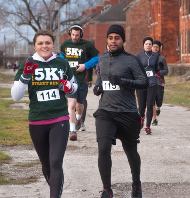
Despite cold morning temperatures, more than 150 people took to the grounds of historic Fort Wayne in Detroit on March 19 for the second annual 5K Street Run, running, jogging and walking their way to raising $3,000 for the Wayne State University School of Medicine's Street Medicine Detroit and the Robert R. Frank Student-Run Free Clinic.
The Frank clinic, at 5555 Connor St., was founded in 2008 and works with Mercy Primary Care Center to provide quality primary care to the uninsured of Detroit. Services include primary and preventive care, health education and awareness, social work/counseling, prescribed medications and minimal laboratory testing.
"Since approximately 90 percent of our patients are unemployed, in addition to being uninsured, we rely heavily on fundraisers such as the 5K to keep our doors open," said first-year medical student and Assistant Director of Fundraising Nina Bihani. "The state of Michigan has approximately one million uninsured patients, and Detroit is no exception to that. Our clinic is only able to make a small dent when it comes to providing care for the uninsured, but we are unique in that we are a full-service clinic focused on providing preventive care, rather than emergent care."
The organization's portion of the money raised will fund the clinic's operating budget, providing patients with access to primary care, lab services and prescription medications, as well as diagnostic procedures like ultrasound and specialty services like ophthalmology.
"We are incredibly appreciative of and grateful to the number of runners and donors who participated this year, in spite of frigid temperatures, to help us in our efforts to support Detroit's vulnerable populations," Bihani said.
For more information or to donate, visit frankclinic.org.
Street Medicine Detroit's mission is to ensure access to quality medical care for Detroit's unreached and service-resistant homeless population. Through direct and regular outreach at shelters and anywhere the homeless stay, the medical students in Street Medicine Detroit bridge the gap between the homeless and medical communities by building relationships and offering companionship and respect, addressing the population's psychosocial and health care needs. The organization, founded in 2012, will use the donations to purchase medications and supplies, and help fund technology updates, including costs to roll out an electronic medical records system.
"Fundraisers are vital for the continuation of our programs and medical outreaches. While we continue to receive funds from the School of Medicine's Alumni Funds and Student Senate, the percentage of our expenses covered by these funds is shrinking every year," said Street Medicine Detroit Communications Director Andrew Darmahkasih. "A large portion of our funding comes from individual donations and fundraisers, and without these donations we would be unable to sustain the work we do."